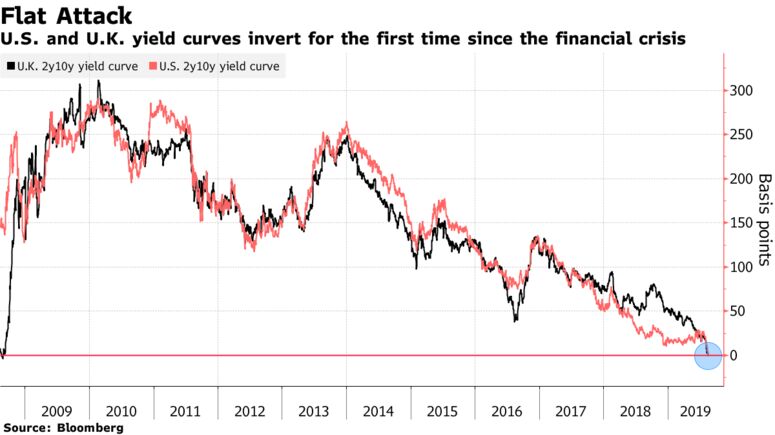Source: Bloomberg
The stream of investors seeking refuge in the safest parts of the market has triggered yet another recession warning, with yield curves inverting from the U.S. to the U.K.
The gap between two- and 10-year yields dropped below zero on both sides of the Atlantic after a wave of soft economic data globally [the last time this happened was 2007, we know what happened in 2008] . Weaker-than-forecast Chinese retail sales and industrial output set the mood for the markets, with data later in the day showing Germany’s economy contracted, adding to the gloom.
“The bond market is saying central banks are behind the curve,” said Marc Ostwald, global strategist at ADM Investor Services in London. “It’s all doom and gloom on the global economy.”
Investors have been driving into areas of the bond market that still offer a positive yield, typically longer-dated assets that offer better returns, in order to protect their funds from a global slowdown in growth. It’s an ominous development because it suggests the prizing of safety over return: the curve is typically upward-sloping, as an investment over 10 years is expected to pay more to compensate for the longer-term risk.
U.S. 10-year yields dropped eight basis points to 1.62%, while those on two-year Treasuries fell three basis points to 1.63%. Thirty-year yields fell to a record low. In the U.K., 10-year yields dropped two basis points to 0.475%, while those on two-year bonds rose one basis point to 0.478% even as inflation jumped above the Bank of England’s 2% target.
This move has been a long time coming, and reflects a significant escalation of growth concerns. The two-to-10-year curve has been on a gradual flattening trend for more than two years on rising doubts about the health of the global economy and weak inflation. Another widely watched recession indicator, the yield difference between three-month and 10-year Treasuries, inverted in March and has been negative much of the time since.
“Where the U.S. leads, the U.K. follows,” said Adam Dent, U.K. rates strategist at Banco Santander SA. “The market has previously been very reluctant to abandon the idea that rates will eventually normalize.”
The curve isn’t the only thing flashing high alert. The Federal Reserve Bank of New York’s index showing the probability of a U.S. recession over the next 12 months is close to its highest level since the global financial crisis, at around 31%.
My add:
If you have read my posts on John Mauldin's The Great Reset, he talked about WeWork.
Interestingly WeWork has filed for IPO and will be listed soon. And this company which leases long term to lease small pockets of office space to freelancers and smaller companies, has garnered a revenue of US$1 billion and guess what is its profit (or rather loss)- a massive close to US$1 billion LOSS and they project an addressable market worth trillions!
This case example above shows how ridiculous business has become - one BIG BUBBLE waiting to pop! Because WeWork can sign lots and lots of long term leases with impunity and rents out small areas to contractors on short term basis and may never make any money (like Uber) as long as they continue growing their revenues- its a revenue game and they effectively transfer all the risks to property lessors - highly irresponsible business model. So if these contractors cannot pay due to the downturn and WeWork cannot raise more money or enough money, property owners will not get their return and in turn cannot service their loans with the bank. This exemplifies the sorts of bubbles America is creating in their own backyard , which can only create systemic risk. And as they get bigger, the failure of WeWork represents a bigger systemic risk to the property and banking system.
https://www.bloomberg.com/news/arti...pushing-now-landlords-rivals-are-pushing-back
So WeWork represents a risk to traditional property brokers, Uber represents a risk (already) to cab drivers, and truck drivers soon to be replaced as well by self driving trucks navigated by software (e.g Otto , an Uber company , see link below). The disruption as we are seeing will create more industry structural unemployment that cannot be so quickly replaced by new economy dominated by AI, with further wealth transfers from the common people to the elite entrepreneurial few
https://www.theguardian.com/technology/2017/oct/10/american-trucker-automation-jobs
- Forums
- ASX - General
- Its Over
Source: Bloomberg The stream of investors seeking refuge in the...
- There are more pages in this discussion • 20,166 more messages in this thread...
You’re viewing a single post only. To view the entire thread just sign in or Join Now (FREE)







